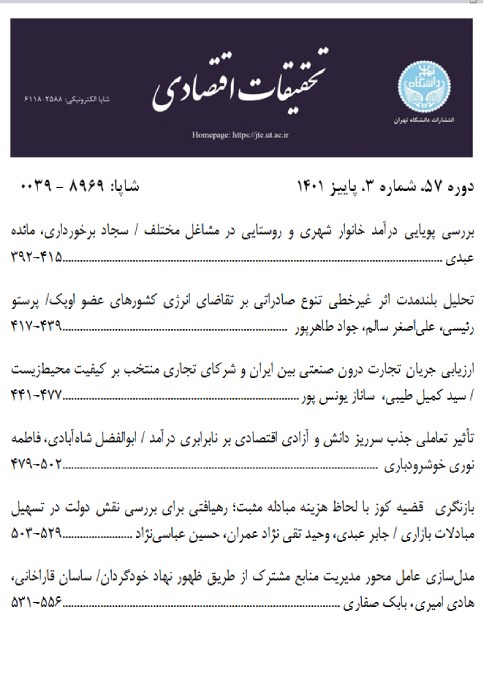The effect of eliminating the preferential exchange rate of basic foodstuffs on income distribution in urban areas of Iran based on micro data simulation using EASI model
The policy of providing foreign currency at preferential exchange rates for the import of basic goods, especially food, was implemented at the beginning of 2018 to support the more vulnerable segments of society. On 9, May, 2022, four years into the implementation of this policy, however, the government eliminated the preferential exchange rate for some commodities such as red meat, chicken meat, eggs, dairy products, and vegetable oils, given the country's economic conditions to target the subsidies, mitigate the negative effects of the policy, and help improve the economic situation. Furthermore the government has also started to pay a monthly sum of 400,000 Tomans to the first three income deciles, and 300,000 Tomans to the next income deciles of society in cash to compensate for the welfare loss to households. This study investigates the effects of removing the preferential exchange rate on the demand for the above-mentioned food and non-food commodities including clothing, housing, transportation, and other goods that are of great importance in the household consumption basket, taking into account some demographic variables including household size, gender, age, education level, and the employment status of the household head in the first weeks of implementing the policy. The percentage increase in the price of the studied food products in the time interval before and after the implementation of the policy is calculated based on the official prices presented by the Ministry of Industry, Mine and Trade. The effect of the implementation of eliminating the preferential exchange rate policy on the welfare of Iranian urban households is investigated by applying the EASI demand system model, extracting price and income elasticities of demand, and simulating the cost data of individual households after the implementation of the above policy using the compensating variation (CV) measure and recalculating the Gini coefficient. According to the results, the Gini coefficient indicating the reduction of inequality, will be relatively improved in the short term if the government implements the policy, assuming the price of other goods remains constant.
- حق عضویت دریافتی صرف حمایت از نشریات عضو و نگهداری، تکمیل و توسعه مگیران میشود.
- پرداخت حق اشتراک و دانلود مقالات اجازه بازنشر آن در سایر رسانههای چاپی و دیجیتال را به کاربر نمیدهد.


